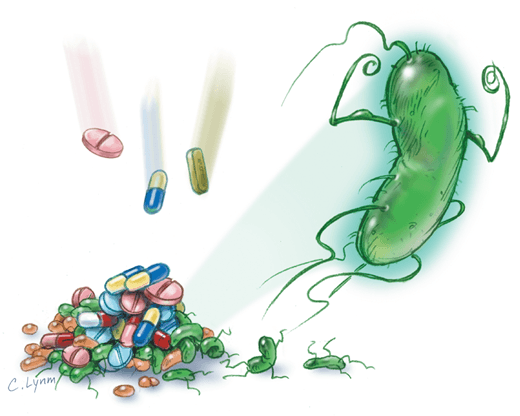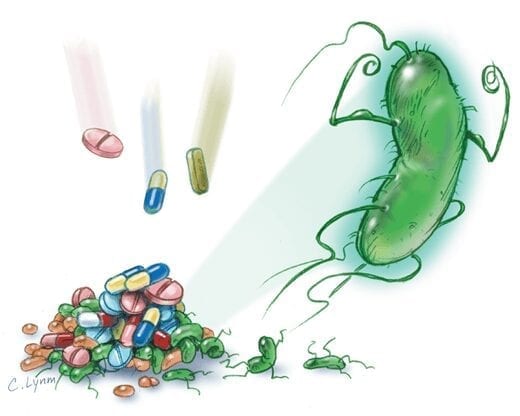
SOME people describe Darwinian evolution as “only a theory”. Try explaining that to the friends and relatives of the 700,000 people killed each year by drug-resistant infections. Resistance to antimicrobial medicines, such as antibiotics and antimalarials, is caused by the survival of the fittest. Unfortunately, fit microbes mean unfit human beings. Drug-resistance is not only one of the clearest examples of evolution in action, it is also the one with the biggest immediate human cost. And it is getting worse.
Stretching today’s trends out to 2050, the 700,000 deaths could reach 10m.
Cynics might be forgiven for thinking that they have heard this argument before. People have fretted about resistance since antibiotics began being used in large quantities during the late 1940s. Their conclusion that bacterial diseases might again become epidemic as a result has proved false and will remain so. That is because the decline of common 19th-century infections such as tuberculosis and cholera was thanks to better housing, drains and clean water, not penicillin.
The real danger is more subtle—but grave nonetheless. The fact that improvements in public health like those the Victorians pioneered should eventually drive down tuberculosis rates in India hardly makes up for the loss of 60,000 newborn children every year to drug-resistant infections. Wherever there is endemic infection, there is resistance to its treatment. This is true in the rich world, too. Drug-resistant versions of organisms such as Staphylococcus aureus are increasing the risk of post-operative infection. The day could come when elective surgery is unwise and organ transplants, which stop rejection with immunosuppression, are downright dangerous. Imagine that everyone in the tropics was vulnerable once again to malaria and that every pin prick could lead to a fatal infection. It is old diseases, not new ones, that need to be feared.
Common failings
The spread of resistance is an example of the tragedy of the commons; the costs of what is being lost are not seen by the people who are responsible. You keep cattle? Add antibiotics to their feed to enhance growth. The cost in terms of increased resistance is borne by society as a whole. You have a sore throat? Take antibiotics in case it is bacterial. If it is viral, and hence untreatable by drugs, no harm done—except to someone else who later catches a resistant infection.
Learn more: When the drugs don’t work
The Latest on: Antibiotic resistance
[google_news title=”” keyword=”antibiotic resistance” num_posts=”10″ blurb_length=”0″ show_thumb=”left”]
via Google News
The Latest on: Antibiotic resistance
- How can CRISPR edit out antimicrobial-resistance?on May 3, 2024 at 6:43 am
Research has recently been presented highlighting the role that CRISPR-Cas technology can play in tackling antimicrobial resistance.
- High levels of resistant bacteria found in uncooked meats and raw dog food: ‘Red flag’on May 1, 2024 at 7:09 pm
High levels of E. coli were found in uncooked meats and raw dog food sold in U.K. grocery stores, according to research presented last week at the ESCMID Global Congress in Barcelona.
- The State Of: Antimicrobial Resistanceon May 1, 2024 at 2:44 am
We take a look at the AMR field, looking at the past, present and future to give you a comprehensive overview of the research landscape.
- Antibiotic Alternative Produced by Gram-Positive Bacteriaon April 29, 2024 at 10:15 pm
Due to increasing antibiotic resistance in pathogens causing infections, the development of new antibacterial substances is needed. Scientists are testing out a new group of substances produced by ...
- Study finds resistance to critically important antibiotics in uncooked meat sold for human and animal consumptionon April 29, 2024 at 8:58 am
New research presented at the ESCMID Global Congress (formerly ECCMID) in Barcelona, Spain (27–30 April) has found substantial levels of resistance to critically-important antibiotics in meat sold for ...
- Antimicrobial resistance projected to kill 10 million people each yearon April 28, 2024 at 10:45 am
Dr. James Gill addresses antimicrobial resistance and its accelerating crisis, emphasizing the need for patient education.
- Cats And Dogs Can Spread Antibiotic Resistant Superbugs To Ownerson April 27, 2024 at 10:55 am
Transfer of bacteria between sick pets and their humans may be contributing to antibiotic resistance, according to new research.
- What to Know About Pivya, the New Antibiotic Treatment for UTIson April 26, 2024 at 4:06 am
The Food and Drug Administration recently approved Pivya (pivmecillinam) to treat uncomplicated UTIs in female adults. Clinical trials show that Pivya is effective and side effects are limited.
- Researchers develop vaccine to fight antibiotic resistanceon April 24, 2024 at 11:37 pm
Driven by the overuse of antimicrobials, pathogens are quickly building up resistances to once-successful treatments. It’s estimated that antimicrobial-resistant infections killed more than 1 million ...
- Antibiotic resistance in babies varies according to mode of birth, prematurity and where they live, says analysison April 24, 2024 at 3:10 pm
A meta-analysis of genetic studies analyzing the microbiota (bacteria in the gut) of 1,275 infants from 10 countries finds that cesarean delivery and antibiotic use are driving the increase of ...
via Bing News











